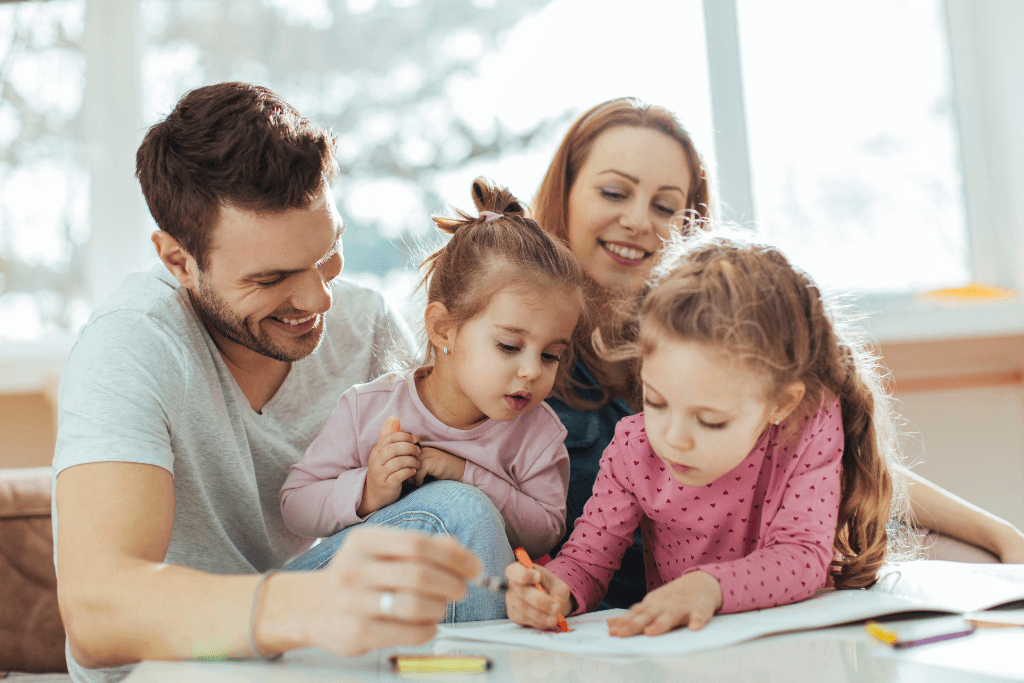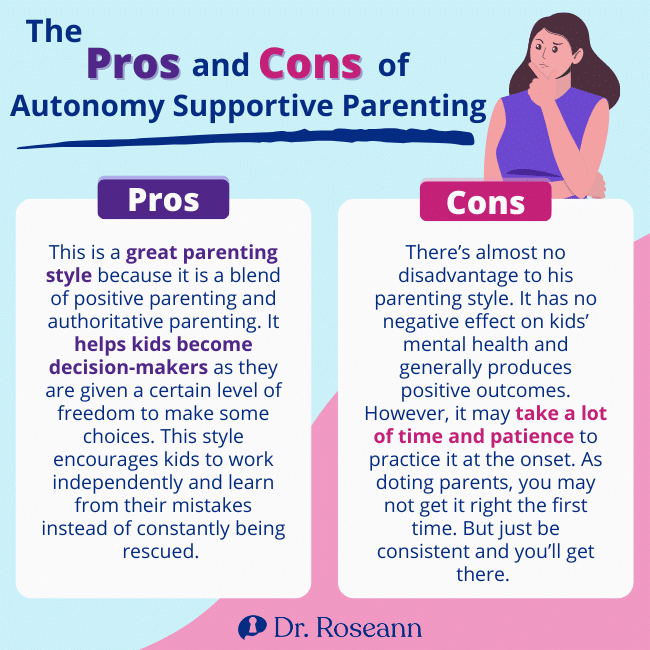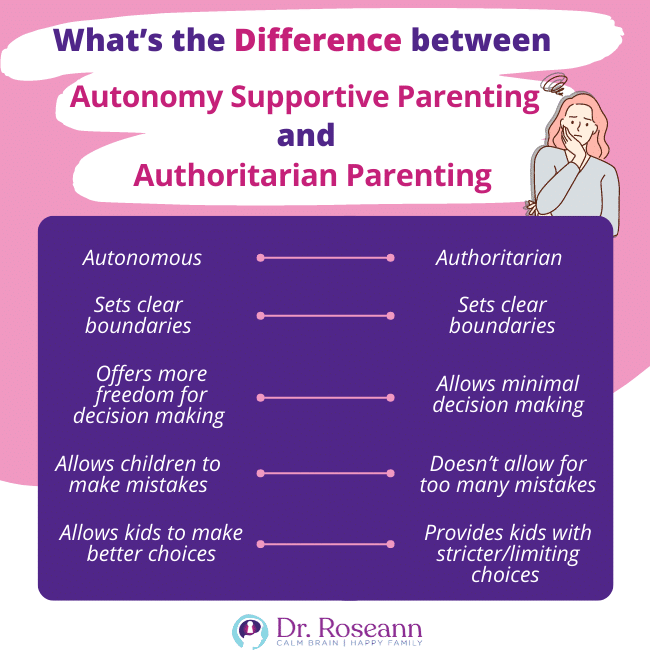As parents, one of our many responsibilities is to guide our children so that they grow up as independent and self-sufficient individuals. However, there is no cookie-cutter process when it comes to raising kids.
As each child is unique, the same parenting style may not work for everyone. Furthermore, each parent has his or her personality, values, and character that have to be considered.
Around 30% of the concerns around child behavior problems can create lasting effects on the life chances of a child. Such problems may be identified during the infancy or toddlerhood stages. Parenting is a significant risk factor in a child's development, though it may still change (Ryan et al., 2017).
Regardless of what style you use, the key to making it work is consistency. Through consistent reinforcement from you, your child simply learns better. As your child learns the right things, you get closer to the desired results related to child behavior.
Authoritarian Parenting
Authoritarian parents are strict parents. This was very common during the 18th century but became still is a common form of parenting. Here, parents tend to enforce strict rules on what a child should and shouldn't do. Parents set high expectations and rigorous standards for their children but won't necessarily offer much support on how to meet them.
There is also a punishment waiting for children of authoritarian parents who fail to follow the rules. Unfortunately, some parents can give harsh punishments, like hitting children every time they do something wrong.
In this style of parenting, there is absolute parental control. That means little to no free will for children and teens.
I remember a mom who came to me for help. She thought that her daughter had a clinical problem because started showing all these behavioral problems whenever she asked her to do something. The mom explained that she was upset about her 4-year-old child being unable to make her bed. She thought that if she put more rules and punishments in place, her behavior would change.
But instead, the results she got were the opposite. After all, she's only 4 years old, and making her make her bed that young may not be appropriate. Thankfully, we were able to address the little girl's behavior problems. When the mom understood that punishment wouldn't help her daughter learn the skill independently, she realized that shifting to a different parenting style was better for child development.
Authoritarian parents tend to believe that punishments are the solution. These parents think that when their children do something wrong, they do it on purpose. But that's not usually the case. Authoritarian parents often parent this way because that is how they were parented and don't know any other way to teach their kids.
The Benefits of Authoritarian Parenting
Research shows that the authoritarian parenting style mostly affects a child negatively, as it may lead to conduct problems (Thompson et al., 2003). However, there may be some benefits to this authoritarian style as well. Children who had authoritarian parents tend to be more obedient and are conscious rule followers. They have a strong sense of what's right and wrong, allowing them to be moral decision-makers as they transition into adulthood.
These children also tend to think hard about the consequences of their actions instead of acting on impulse. When authoritarianism is done right without corporal punishment, these kids could end up as well-disciplined, high-achieving individuals. They also tend to be self-motivated, independent people.
The Negatives of Authoritarian Parenting
Kids with authoritarian parents are prone to exhibiting internalizing behaviors, such as feeling lonely, afraid, or withdrawn. They also tend to have lower self-esteem, which can persist into adulthood. These kids fear failing and they may react in an aggressive or hostile manner when criticized. In turn, they tend to be very critical of others too, which lends itself to conflict with others throughout their life.
When not corrected, such behaviors may develop into anger problems or mental health issues. The biggest disadvantage to using punishment is that you emphasize the things that are done wrong instead of teaching your children what is right. When you grow up insecure and fearful, not only do you lack self-confidence, but you also can't reach your full potential.
Autonomy Supportive Parenting
Autonomy supportive parenting is a supportive parenting style that involves the child in the decision-making process. This parenting style hopes that the children's involvement will encourage them to become independent individuals who are prepared to make bigger decisions in the future.
Some tips for practicing autonomy-supportive parenting include giving your child unconditional love, letting your child make age-appropriate decisions, teaching active listening skills and empathy through demonstration, validating your child's emotions, and reinforcing their competence.
This is my favorite style of parenting and I practice it every day. One day, I saw my kid cooking some soup. He placed three tablespoons of hot sauce in the pot and asked me if his soup was going to be hot. Instead of answering, I asked him what he thought.
He answered, “I don't think it's going to be that hot.” I said to him, “Well, what's the worst thing that could happen?” He said, “It could be too hot.” Then I asked again, “What will you do to fix it if it is too hot?” His answer was, “I'll add more water.”
In that example, I allowed my child to make an error in cooking. With autonomous parenting, you allow your children to make some mistakes within a safe boundary. My kid's soup ended up burning hot! He just added more water and some bouillon cubes and it turned out fine. We had some tasty soup, and he gained some confidence and problem-solving skills.
You want your kids to have the confidence to make those little decisions. This will help them become good problem solvers especially when you're not around. It will also train them to easily reject ideas that are wrong and not do things that are going to get them into trouble. They also are not likely to be impulsive decision-makers well into adulthood.
The Benefits of Autonomy Supportive Parenting
This is a great parenting style because it is a blend of positive parenting and authoritative parenting. It helps kids become decision-makers as they are given a certain level of freedom to make some choices. This style encourages kids to work independently and learn from their mistakes instead of constantly being rescued.
These kids will also exhibit increased intrinsic motivation, stronger internal drive, and possess better executive functioning. They are also more resilient, have better school performance, and possess higher self-confidence. They will exhibit better social behaviors and have a more developed emotional state.
These kids are more behaviorally regulated because they have the problem-solving and coping skills to manage frustrations and unexpected challenges.
The Negatives of Autonomy Supportive Parenting
There's almost no disadvantage to this parenting style. It has no negative effect on kids' mental health and generally produces positive outcomes. However, it may take a lot of time and patience to practice it at the onset. As doting parents, you may not get it right the first time. But just be consistent and you'll get there.
Authoritative Parenting
The authoritative parenting style tends to seek the balance between being firm and being supportive. They set limits for their kids, but they also try to balance it with love. It's all about giving your children some boundaries but still allowing them to make their own decisions.
Authoritative parents set clear rules for their kids but would also take the time to discuss why those rules must be followed. Here, parents make it clear that they are in charge while still giving their kids some freedom. However, they will also hold their kids accountable if they fail to follow the rules. These are the foundational factors of this style of parenting.
The authoritative style is almost like autonomous parenting, although the latter gives a child more room to make mistakes. Autonomous parents also give more freedom to decision-making while authoritative parents are stricter on the choices provided.
The Benefits of Authoritative Parenting
This parenting style is a very popular and widely used approach. It is a healthy way of parenting, and kids with authoritative parents can be cheerful, helpful, and friendly. They are also self-reliant, goal-oriented, and naturally curious.
One study showed that authoritative parenting facilitates improved academic achievement among adolescents (Steinberg et al., 1989). Children of authoritative parents tend to develop a positive attitude towards their achievements, which allows them to work harder in school. These kids make great leaders because they are accountable, respectful, resilient, and studious.
The Negatives of Authoritative Parenting
Authoritative parenting is a popular parenting method, and some developmental psychologists even recommend it because it can be effective. However, it may be difficult to execute because some parents struggle to find the delicate balance between freedom and discipline. Parents have to do a lot of trial and error to find the strategies that work, and it may take them a while to be consistent.
Permissive Parenting
A permissive parenting style is when parents act more like a buddy to their child than a parent. This suggests that there are no healthy boundaries in their parent-child relationship.
If the parents are too friendly, their kids may not necessarily look up to them as role models. Indulgent parents also tend to give their children limited rules and not monitor them closely all the time.
I had a situation where a kid's dad was a permissive parent, but the mom wasn't. The child was displaying clinical issues around restrictive eating. The dad, because of his permissive style, wasn't able to see the eating disorder of their son. But the mom recognized it as a serious problem.
Permissive parents tend not to recognize their kid's behavioral issues. Because there are no well-defined roles and boundaries, parents can't see their children's needs and their children don't turn to them for help.
Kids crave boundaries and with permissive parenting, there may be an enmeshment that carries over to future relationships. Boundary setting is an important life skill and kids learn that from the parent-child relationship.
The Benefits of Permissive Parenting
The children of permissive parents are generally free thinkers and have strong minds. They aren't afraid to share their opinions, be creative, or think outside the box. They're not the type that can be easily bossed around. It will be very hard to convince them to do something that they don't think is right.
The Bad Benefits of Permissive Parenting
The biggest disadvantage of permissive parenting is that kids grow up to show resistance to rules and authority. Because there are minimal rules in their home, these kids may see rules as a detriment to their freedom. For example, they may find it difficult to meet deadlines, show up on time, and follow rules at school or work.
Free Range Parenting
Free-range parenting is very similar to permissive parenting. Kids who are raised in the free-range parenting style get minimal supervision. But this doesn't mean that parents let their children do whatever they want to do.
While these parents tend to leave their children to their means depending on their age and needs, their ultimate goal is to instill independence within them. Here, kids can do what they want. This style of parenting can present serious safety issues and frankly, borders on irrational thinking. Parents shouldn't just let their kids do what they want at any age because it's unsafe and can lead to harm.
I have seen this style practiced by parents with their older kids. I knew a mom who allowed her teen son to smoke pot because she thought it was better than taking LSD. She told me that since most of the kids are using psychedelics, she'd rather that he smoked pot instead. Pretty illogical for sure!
It is almost like encouraging substance abuse and it is not a good thing. Her son ended up having very significant psychological issues, including school refusal. He was never able to return to school.
The Benefits of Free Range Parenting
Free-range parenting has little to no advantages. The small number of children who turned out all right with this style of parenting is likely to be more independent and resilient than their peers. For example, they can stay away from home for an extended period without any issues.
Some can better handle challenges or setbacks that they encounter, as they are forced to be more creative and solve problems on their own.
The Negatives of Free Range Parenting
With free-range parenting, you're putting your kid in danger. While letting kids explore things on their own may go either way, it almost always doesn't end up right.
These children can also have self-esteem issues, as they may feel uncared for and unloved.
Uninvolved Parenting
With the uninvolved parenting style, parents neglect their kids entirely. They don't provide them with safety or structure and just let them go on their own. It's a neglectful parenting style where parents fail to meet the physical health requirements and emotional needs of their children because they provide little to no supervision.
The Benefits of Uninvolved Parenting
Like free-range parenting, there are no obvious advantages to this style. In some rare cases, children of neglectful parents tend to develop self-reliance at a very early age since they are mostly the ones taking care of their own needs.
The Negatives of Uninvolved Parenting
There are a lot of disadvantages to uninvolved parenting and most experts agree that the children subjected to it are likely to encounter serious mental health problems in the future.
Children of uninvolved parents also have low self-esteem and they find it difficult to form healthy and trusting relationships with other people, especially if they have experienced trauma.
Attachment Parenting
Attachment parenting is like authoritative parenting in certain ways. It is based on the attachment theory, which states that humans experience the need to form an emotional bond with their caregiver, especially during early childhood. But unlike authoritative parenting, this style emphasizes physical touch and affection.
Children tend to stay close to their parents physically. As children tend to be submissive, parents can easily assume authority. It is through close physical proximity and communication that children experience a loving bond that helps them to develop.
The Benefits of Attachment Parenting
It is through a loving bond that is at the core of attachment parenting that children obtain the tools they need to deal with life struggles. These children can cope with stress and adversity just fine because they get support from their parents. With all that unconditional love, these kids tend to grow up assured and confident.
The Negatives of Attachment Parenting
Children with attached parents may have difficulty working independently. With so much connectedness with their parents, these kids can over-rely on them and not develop self-regulation and decision making skills. It is hard to learn how to do things on your own when mom is always around!
This approach affects the parents too because it is very intense and can be quite exhausting to always be available and in close proximity to your child. When the parent's energy is mainly focused on tending to their child's needs, it may get to the extent that their own needs are neglected.
Many parents who prescribed to attachment parenting are tired and overwhelmed at times. It can also put a strain on marriages because the mom is so hyper-focused on the children.
Helicopter Parenting
The concept of helicopter parenting was first introduced in Dr. Haim Ginott's book entitled “Between Parent & Teenager”. In this parenting style, parents tend to hover over their kids like a helicopter.
Parents get so focused on the affairs of their children that they take full responsibility for their successes and failures. Children are monitored closely and don't have the chance to explore things on their own.
Helicopter parents get involved and micromanage their kids' lives. From schoolwork to soccer, they are trying to manage it all. This is the parent that is telling the lacrosse coach just how to coach and play their kid. Yeah, you know who they are!
The Benefits of Helicopter Parenting
If there's any advantage to helicopter parenting, it's the idea that parents know where their children are at and what they are doing at all times. They have this feeling of assurance that their kids are exactly where they should be (typically because they are with them!).
The Negatives of Helicopter Parenting
There are several disadvantages to helicopter parenting, which is why many experts advise against it. Children of helicopter parents tend to find it difficult to cope with loss, failure, and disappointment. They also exhibit increased anxiety and a high sense of entitlement.
Bubble Wrap Parenting™
This parenting style is much like helicopter parenting, but worse. Here, parents “bubble wrap” their kids and never allow them to make mistakes. This is one of the reasons why there are many kids with low-stress tolerance. Kids with low-stress tolerance tend to make simple problems a lot more complicated because they have no skills to deal with them.
The Benefits of Bubble Wrap Parenting™
Parents who are bubble wrapping their kids are most likely doing it with the noblest intentions. After all, which parent wants harm to come to their child? It's normal for parents to protect their children. But when done excessively, this may produce the opposite result.
The Negatives of Bubble Wrap Parenting™
This parenting style could create kids with a lot of anxiety and other clinical issues because they don't know how to tolerate the feeling of discomfort.
These kids don't know how to tolerate feeling uncomfortable or manage frustration because they are so used to mom or dad swooping in to save the day.
Such kids also struggle with simple problem-solving because most of the things they ought to do have been done for them. If you bubble-wrap your kids, you make it harder for them to cope with difficult situations.
Find the Most Effective Parenting Style for your Kid
Parenting is never easy. There will always be challenges along the way, more so if you're a single parent or live in a multi-generational household with lots of opinions. But while there are different types of parents, they generally have a common goal and that is to raise a child who is happy, healthy, and independent.
There are also important factors to consider aside from your style of parenting that could affect child outcomes. These are culture, child's temperament, and socioeconomic status, among others.
Parenting interventions during the first three years of the child's life really can enhance child development outcomes. Increasing the implementation of high-quality and effective parenting interventions should be done in a way to support parents while enabling children to reach their maximum developmental potential (Jeong et al., 2021).
Learning about how the basic parenting styles affect your child allows you to assume the style of parenting that suits you best. This will almost assure positive outcomes and promote better child behavior.
Parents must use positive parenting styles that emphasize parental emotional warmth toward their kids to ensure that altruistic behavioral tendencies and positive perfectionism help improve their mental health (Feng et al., 2021).
We're here to guide you on your quest for the most effective parenting style so you can be the type of parent who is focused on raising a child with a high level of self-esteem and self-competence. Just remember that if you are guided with love and concern for your children, you can be the confident parent that you wanted to be.
If you are working really hard as a parent and your child is still struggling, then reach out to a licensed mental health professional or apply to work with our team. Just remember that no one ever regrets getting help, they only regret it when they don't.
Citations
Thompson, A., Hollis, C., & Richards, D. (2003). Authoritarian parenting attitudes as a risk for conduct problems. European Child & Adolescent Psychiatry, 12(2), 84–91. https://doi.org/10.1007/s00787-003-0324-4
Steinberg, L., Elmen, J. D., & Mounts, N. S. (1989). Authoritative Parenting, Psychosocial Maturity, and Academic Success among Adolescents. Child Development, 60(6), 1424. https://doi.org/10.2307/1130932
Feng, L., Zhang, L., & Zhong, H. (2021). Perceived Parenting Styles and Mental Health: The Multiple Mediation Effect of Perfectionism and Altruistic Behavior. Psychology research and behavior management, 14, 1157–1170. https://doi.org/10.2147/PRBM.S318446
Ryan, R., O'Farrelly, C., & Ramchandani, P. (2017). Parenting and child mental health. London journal of primary care, 9(6), 86–94. https://doi.org/10.1080/17571472.2017.1361630
Jeong, J., Franchett, E. E., Ramos de Oliveira, C. V., Rehmani, K., & Yousafzai, A. K. (2021). Parenting interventions to promote early child development in the first three years of life: A global systematic review and meta-analysis. PLoS medicine, 18(5), e1003602. https://doi.org/10.1371/journal.pmed.1003602
Always remember… “Calm Brain, Happy Family™”
Are you looking for SOLUTIONS for your struggling child or teen?
Dr. Roseann and her team are all about solutions, so you are in the right place!
There are 3 ways to work with Dr. Roseann:
You can get her books for parents and professionals, including: It’s Gonna Be OK™: Proven Ways to Improve Your Child’s Mental Health, Teletherapy Toolkit™ and Brain Under Attack: A Resource For Parents and Caregivers of Children With PANS, PANDAS, and Autoimmune Encephalopathy.
If you are a business or organization that needs proactive guidance to support employee mental health or an organization looking for a brand representative, check out Dr. Roseann’s media page and professional speaking page to see how we can work together.
Dr. Roseann is a Children’s Mental Health Expert and Therapist who has been featured in/on hundreds of media outlets including, CBS, NBC, FOX News, PIX11 NYC, The New York Times, The Washington Post,, Business Insider, USA Today, CNET, Marth Stewart, and PARENTS. FORBES called her, “A thought leader in children’s mental health.”

She is the founder and director of The Global Institute of Children’s Mental Health and Dr. Roseann Capanna-Hodge. Dr. Roseann is a Board Certified Neurofeedback (BCN) Practitioner, a Board Member of the Northeast Region Biofeedback Society (NRBS), Certified Integrative Medicine Mental Health Provider (CMHIMP) and an Amen Clinic Certified Brain Health Coach. She is also a member of The International Lyme Disease and Associated Disease Society (ILADS), The American Psychological Association (APA), Anxiety and Depression Association of America (ADAA) National Association of School Psychologists (NASP), International OCD Foundation (IOCDF) International Society for Neurofeedback and Research (ISNR) and The Association of Applied Psychophysiology and Biofeedback (AAPB).
© Roseann-Capanna-Hodge, LLC 2023
Disclaimer: This article is not intended to give health advice and it is recommended to consult with a physician before beginning any new wellness regime. *The effectiveness of diagnosis and treatment vary by patient and condition. Dr. Roseann Capanna-Hodge, LLC does not guarantee certain results.















